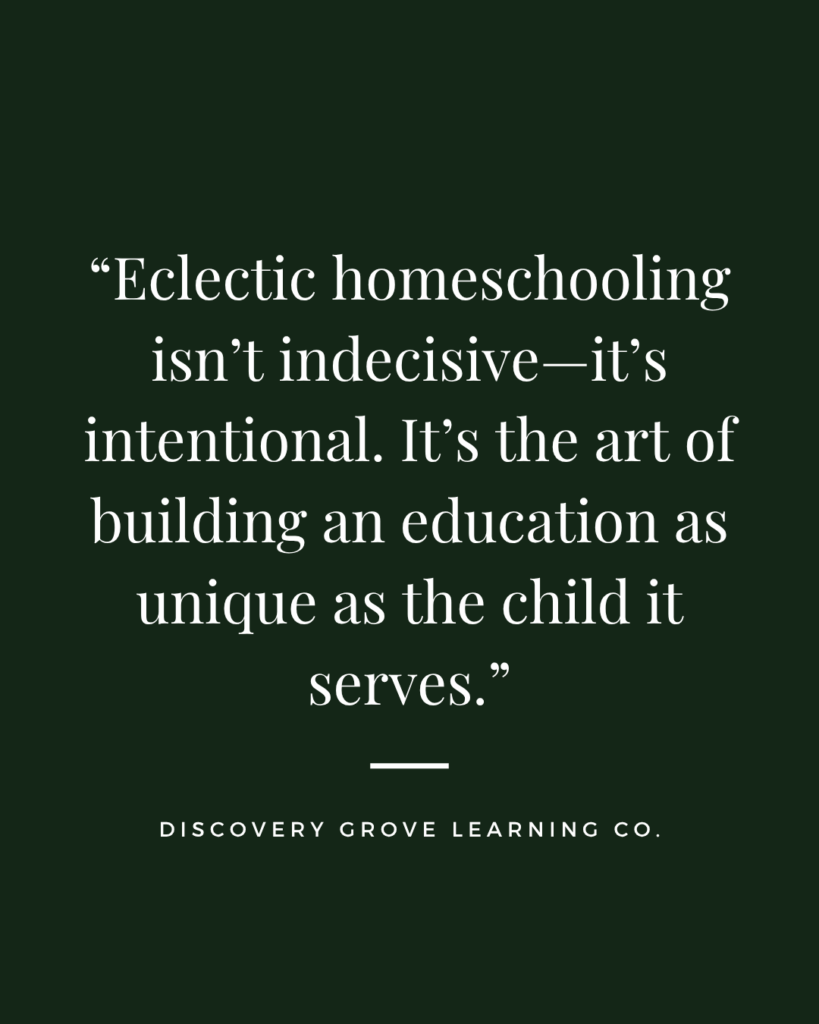
When you first step into the world of homeschooling, it can feel like entering a maze of educational philosophies, methods, and must-haves. Charlotte Mason? Montessori? Classical? Waldorf? Unit Studies? Suddenly you’re surrounded by terminology and teaching styles that seem to demand allegiance. But what if none of them fits exactly right?
That’s where eclectic homeschooling comes in—a flexible, intentional approach that lets you borrow the best of each method to build a homeschool that works for your family.
What Is Eclectic Homeschooling?
Eclectic homeschooling is a philosophy that prioritizes what works over following a single method. It means thoughtfully curating your homeschool experience using pieces from various educational models, resources, and rhythms. It’s part strategy, part instinct, and fully customizable.
At its core, eclectic homeschooling is:
- Flexible: You choose what serves your children today, knowing that might change tomorrow.
- Practical: You don’t get stuck in a philosophy that doesn’t fit. You adapt.
- Intentional: You’re not randomly pulling from Pinterest. You’re choosing resources that align with your goals and your children’s needs.
It’s not disorganized or aimless. In fact, many eclectic homeschoolers are deeply thoughtful about their choices—they just don’t box themselves in.
I think something that had gotten lost culturally was the concept that there is—in fact—many different right ways to educate and pursue education. With the public school system, a large focus is on creating an equal opportunity to be educated. This is absolutely wonderful and something I fully get behind. Every child, every person, has a right to education.

The thing is, however, in order to provide an equal opportunity for an education, you have to first define what constitutes a good or solid education. To do that you have to standardize education—create a sameness across the board. Now, with the goal of creating an equal opportunity to an education, this makes perfect sense. The sticky side effect, however, has been that it’s created a cultural belief that the standards and pacing enforced in public education is the right way to educate a child—that a child should know and be able to do the things listed in the standards for the age-based grade levels. No exceptions.
The mindset that there is only one best or right way to educate is the problem. And it’s something that as homeschooling has become more obviously widespread, is getting increasingly untangled.
But even with homeschooling acknowleding that there are many different ways to educate, there is still and understanding that you need to pick THE one.
Elective homeschooling isn’t indecisive—it’s intentional. It’s the art of building an education as unique as the child it serves.
Major Educational Philosophies (in a nutshell)
To be eclectic, it helps to know what you’re blending. Here’s a brief overview of the most common approaches homeschoolers pull from:
Charlotte Mason
- Emphasizes living books, nature study, narration, and short, focused lessons
- Rooted in beauty, habit formation, and gentle exposure to great ideas
Classical
- Focuses on the Trivium (grammar, logic, rhetoric stages)
- Emphasizes memorization, Socratic dialogue, and mastering the classics
Montessori
- Child-led, hands-on, and focused on independence
- Encourages tactile materials, real-life skills, and prepared environments
Waldorf
- Values rhythm, imagination, nature, and holistic development
- Introduces academics slowly and weaves in the arts, movement, and stories
Unit Studies
- Integrates multiple subjects around a central theme or topic
- Great for teaching multiple ages together in an engaging way
Unschooling
- Focuses on child-led, interest-driven learning
- Emphasizes autonomy, real-world experience, and intrinsic motivation
Project-Based Learning (PBL)
- Encourages deep, student-centered exploration through projects
- Builds critical thinking, creativity, and real-world application
Why Families Choose Eclectic Homeschooling
More and more families are embracing an eclectic style for one simple reason: it works.
Here are just a few of the benefits:
- You get to meet your kids where they are. One child may thrive with Charlotte Mason copywork and another with a messy STEM project.
- You can adjust over time. Your homeschool doesn’t have to look the same every year, or even every month.
- It fosters a love of learning. When kids experience variety and meaningful learning, they stay engaged and curious.
- You can teach to strengths without ignoring weaknesses. Eclectic homeschoolers aren’t limited by one framework. You can tackle spelling with a classical method and let math be Montessori-style hands-on.
- It gives you permission to trust your intuition. As a parent, you do know your child best. Eclectic homeschooling gives you permission to act on that.
A Real-World Example: What It Looks Like

Let’s say your family is exploring a unit on mountains.
- You begin with a Charlotte Mason-style nature walk, collecting leaves and sketching trees in your nature journal.
- You read a few living books about mountaineering and geology.
- For science, you build a 3D model of tectonic plates using clay—a very Montessori-style hands-on experience.
- For writing, your children create their own stories set in a mountain village, using project-based storytelling.
- You even pull in a short memorization piece about mountain ranges for your classical-leaning child.
This is eclectic homeschooling. It’s rooted in what matters—deep, connected learning—and not bound by rigid checklists.
How Discovery Grove Learning Co. Embraces Eclectic Homeschooling

At Discovery Grove Learning Co., we believe the best education draws from the richness of multiple philosophies. That’s why our curriculum doesn’t claim a single label. Instead, it blends:
- Charlotte Mason: With rich read-alouds, values-based themes, nature study extensions, and narration-style comprehension
- Project-Based Learning: Every unit includes hands-on projects that bring learning to life across multiple subjects
- Unit Studies: Our themes like Bravery, Wonder, and Creativity unite literature, writing, science, art, and more
- Montessori Elements: We encourage child-led exploration, hands-on materials, and practical life connections
- Waldorf Influence: We value rhythm, seasonal themes, and imaginative exploration grounded in nature and the arts
- Flexibility: We choose whatever method works best for the subject at hand—because your homeschool deserves tools, not chains.
You won’t find endless worksheets or rigid scripts. Instead, you’ll find story-centered learning, open-ended projects, and a rhythm that respects both your family’s needs and your child’s pace.
This is the energy I work to bring to the units and courses in Discovery Grove Learning Co. educational ecosystem.
Our goal? To equip you to homeschool with confidence, creativity, and connection.
Is Eclectic Homeschooling Right for You?
If you’ve ever wished you could:
- Mix and match resources without guilt
- Tailor learning to your child’s mood or season
- Encourage deep thinking and joyful discovery
- And still not feel like you have to plan and work on the fly
…then you’re already walking the eclectic path.
And you’re not alone.
Thousands of families are embracing a way of homeschooling that is deeply personal, flexible, and inspiring. At Discovery Grove Learning Co., we’re here to walk that path with you—one story, one project, one moment of connection at a time.
Ready to explore eclectic homeschooling the Discovery Grove way?
Look out for our upcoming launch of Art of Language: The Hobbit unit and experience literature-based, hands-on, open-and-go learning rooted in everything that matters most.
#eclectichomeschool #projectbasedlearning #literaturebasedhomeschool #homeschoolcurriculum #discoverygrovelearningco #charlottemasoninspired #montessoriathome #unitstudies #homeschoollife